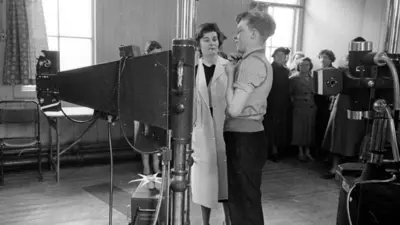We've updated our Privacy and Cookies Policy
We've made some important changes to our Privacy and Cookies Policy and we want you to know what this means for you and your data.
Organ donation: Jewish and Muslim presumed consent worries
Plans to introduce presumed consent organ donation in Wales face opposition from within the Jewish and Muslim communities.
Some members of both religions have concerns about Welsh government proposals to create the UK's first opt-out donor system.
It would mean everyone is deemed to be a willing organ donor when they die, unless they have stated otherwise.
The Welsh government said it was committed to working with faith groups.
Other religious leaders have already voiced their objections to the plan.
Families of the deceased will still be involved in decisions about donation under the "soft opt-out" system.
A survey conducted as part of a consultation into the draft Human Transplantation Bill found 49% were in favour and 22% were against.
But of the 2,891 responses to the consultation, 2,395 were identical letters signed by Muslims from Swansea, Cardiff and Newport based on a template produced by the Society for the Protection of Unborn Children.
Dr Abdalla Yassin Mohamed, director of Cardiff's Islamic Social Services Association and a member of the Muslim Council of Wales, said he had no objection to presumed consent.
Opposition was based on concern about the definition of brain death in Islam and the issue of consent, he said.
He called for a debate about the bill between medical and Islamic clerical experts.
"That information should then be given to key figures in the Muslim community because they are like role models," he said.
"When those role models are convinced then people will have no problem."
Dr Sajad Ahmad, a GP from Cardiff, who was one of those who petitioned against the bill, said: "I personally feel this is being rushed in without due consideration and discussion. To presume that a person's liver is yours after they have died - that's wrong."
'Taken as a gift'
Stanley Soffa, chairman of the South Wales Jewish Representative Council, said: "We believe that people should be able, or the family of the deceased should be able, to agree to organs being taken as a gift as a donation.
"I would have preferred there not have been a bill."
Welsh government officials stress that passing the bill will not change key aspects of clinical procedure.
At present, specialist nurses approach families of potential donors even if they have not signed the donor register, some 60% of whom agree to organs being taken.
The Welsh government believes that by passing the legislation, the figure will increase. It hopes to create 15 extra donors leaving around 45 more organs for transplant throughout the UK every year.
The bill has been discussed at the Welsh government's faith forum, chaired by the first minister, and a specialist firm has been contracted in an attempt to reach out to minority groups.
NHS leaflets endorsing organ donation for specific faiths are being distributed, including one which the Welsh government says sets out the "key facts regarding Islam and organ donation".
A Welsh government spokesman said: "We are fully committed, as part of the legislation, to ensure we communicate the changes to everyone in Wales.
"We are now reviewing the draft bill and the way we explain the role of the family in light of the consultation responses.
"We will continue to work with the faith communities in Wales and officials have met with Muslim and Jewish groups."
He added: "Under the current system, clinicians take a sympathetic approach with families and strive to help them make decisions in accordance with their faith, even though if the person is on the organ donor register they have the legal right to proceed with transplantation.
"There will be the same approach in principle if the new law is passed."
Top Stories
More to explore
Most read
Content is not available








